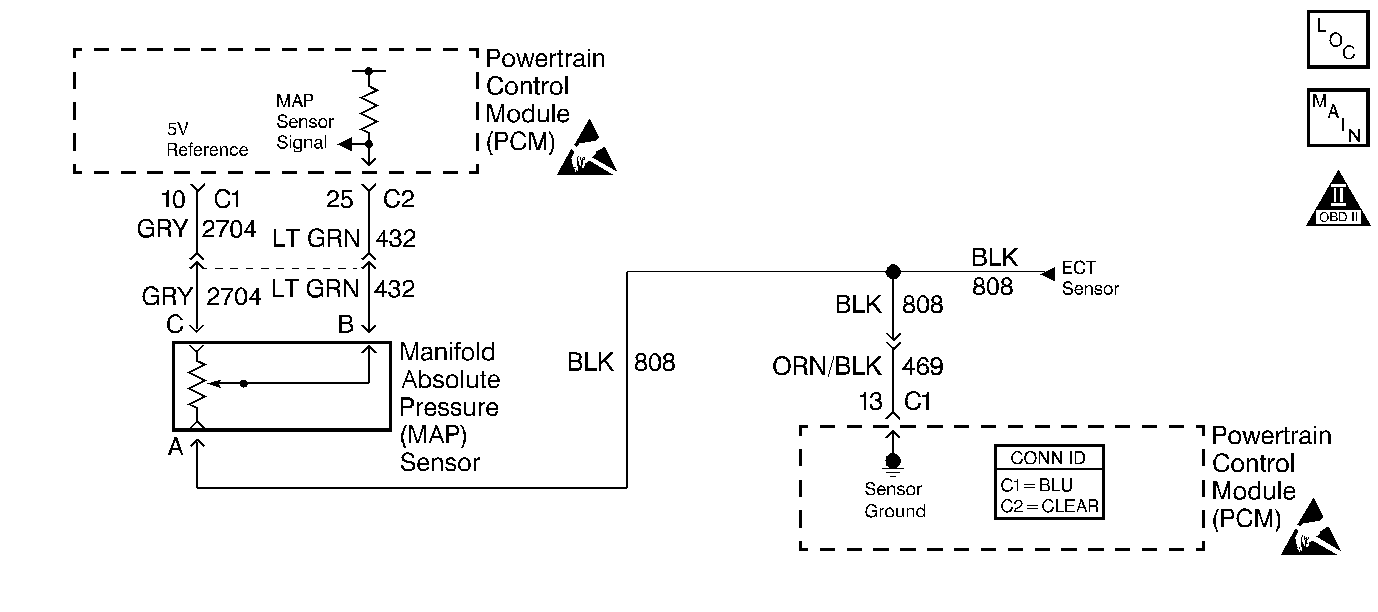
Circuit Description
The Manifold Absolute Pressure (MAP) sensor responds to changes in intake manifold pressure (vacuum). The MAP sensor signal voltage to the PCM varies from below 2.0 volts at idle (high vacuum) to above 4.0 volts with the key on, engine not running or at wide-open throttle (low vacuum).
The MAP sensor is used to determine manifold pressure changes while the linear EGR flow test diagnostic is being run (refer to DTC P0401 Exhaust Gas Recirculation (EGR) Flow Insufficient ), to determine engine vacuum level for some other diagnostics and to determine barometric pressure (BARO). The PCM monitors the MAP signal for voltages outside the normal range of the MAP sensor. If the PCM detects a MAP signal voltage that is intermittently high, DTC P1106 will be set.
Conditions for Running the DTC
| • | No TP sensor DTC(s) are present. |
| • | Ignition on. |
| • | Throttle angle is steady below 30% if engine speed is below 3000 RPM. |
| • | Throttle angle is steady below 5% if engine speed is above 3000 RPM. |
Conditions for Setting the DTC
| • | The MAP sensor indicates an intermittent manifold absolute pressure above 90 kPa. |
| • | Above conditions for over 10 seconds. |
Action Taken When the DTC Sets
The PCM stores conditions which were present when the DTC set as Failure Records only. This information will not be stored as Freeze Frame Records.
Conditions for Clearing the MIL/DTC
| • | The DTC becomes history when the conditions for setting the DTC are no longer present. |
| • | The history DTC clears after 40 malfunction free warm-up cycles. |
| • | The PCM receives a clear code command from the scan tool. |
Diagnostic Aids
Check for the following conditions:
| • | Monitor the MAP sensor using the scan tool. If the MAP sensor does not respond to throttle changes, check the 3X circuits from the ignition control module to the PCM. |
| • | If the 3X signal is lost the PCM will only update the MAP sensor reading once per key cycle, when the engine is first started. |
| • | Depending on where the MAP sensor voltage (high voltage or low voltage) is when the engine is started, the high or low voltage MAP sensor DTC's will set. |
Important: : Remove any debris from the connector surfaces before servicing a component. Inspect the connector gaskets when diagnosing or replacing a component. Ensure that the gaskets are installed correctly. The gaskets prevent contaminate intrusion.
| • | Poor terminal connection. |
| Inspect the harness connectors for backed out terminals, improper mating, broken locks, improperly formed or damaged terminals, and faulty terminal to wire connection. Use a corresponding mating terminal to test for proper tension. Refer to Intermittents and Poor Connections Diagnosis , and Connector Repairs Wiring Systems. |
| • | Damaged harness. |
| Inspect the wiring harness for damage. If the harness appears to be OK, observe the sensor display on the scan tool while moving connectors and wiring harnesses related to the sensor. A change in the sensor display may indicate the location of the fault. Refer to Wiring Repairs in Wiring Systems. |
| • | Inspect the PCM and the engine grounds for clean and secure connections. |
If the DTC is determined to be intermittent, reviewing the Fail Records can be useful in determining when the DTC was last set.
Step | Action | Value(s) | Yes | No | ||||||
|---|---|---|---|---|---|---|---|---|---|---|
1 | Was the Powertrain ON Board Diagnostic system Check performed? | -- | ||||||||
2 | Select DTC info, Last Test Fail and note any other DTCs set. Is DTC P0108 also set? | -- | Go to other DTC chart first | |||||||
3 | Is DTC P1111, P1115, and/or P1121 also set? | -- | ||||||||
4 | Check for a poor sensor ground circuit terminal connection at the MAP Was a problem found? | -- | ||||||||
5 | Check the MAP signal circuit between the MAP sensor connector and the PCM for an intermittent short to voltage. Refer to Wiring Repairs . Was a problem found? | -- | ||||||||
6 |
Was a problem found? | -- | ||||||||
7 | Check for a poor sensor ground circuit terminal connection at the PCM. sensor. Refer to Testing for Continuity Intermittents and Poor Connections Diagnosis Repairing Connector Terminals and Connector Repairs . Was a problem found? | -- | ||||||||
8 | Check for an intermittent open or a faulty splice in the sensor ground circuit. Refer to Wiring Repairs . Was a problem found? | -- | Go to Diagnostic Aids | |||||||
9 | Replace the faulty harness connector terminal for sensor ground circuit. sensor. Refer to Testing for Continuity Intermittents and Poor Connections Diagnosis Repairing Connector Terminals and Connector Repairs . Is the action complete? | -- | -- | |||||||
10 | Locate and repair intermittent open/short circuit in wiring harness as necessary. sensor. Refer to Testing for Continuity Intermittents and Poor Connections Diagnosis Repairing Connector Terminals and Connector Repairs . Is the action complete? | -- | -- | |||||||
11 |
Does scan tool indicate DTC P1106 failed? | -- | System OK |
